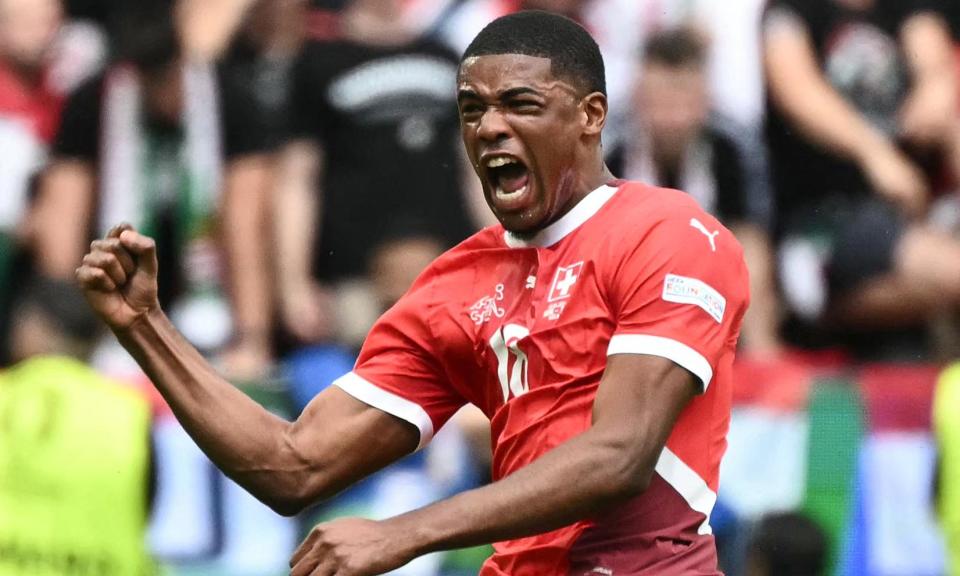Switzerland hold off Hungary fightback after Duah bursts on to the scene

They shoot dark horses, don’t they? Just like Turkey at the last Euros, Hungary have been so widely tipped as plausible outsiders that expectations have perhaps reached unreasonable levels. Like Turkey three years ago, Hungary began with a defeat and looked a long way from being a side capable of challenging.
For Switzerland, the opposite is true. For them, there could hardly have been a greater symbol of their unexpected urgency than the substitute Breel Embolo, who sustained a cruciate ligament injury in August, surging through in injury time, the strapping flying from his knee as he seized on Willi Orban’s misplaced header to lob the ball over Peter Gulacsi and seal the win. “Embolo’s ability to hold the ball up made us feel very safe,” said Murat Yakin, who praised Embolo’s commitment to get fit and his medical staff.
For all but about 20 minutes of the second half, the result wasn’t really in doubt. Switzerland were quicker, slicker and cleverer than Hungary and fully deserved their win. “The first half we had a tactical misunderstanding,” said the Hungary manager, Marco Rossi.
“They were playing a 3-4-3 that was more like a 3-5-2 with [Michel] Aebischer, who was always cutting infield. I lost my voice trying to draw their attention to this. The first half was very bad, but I told them at half-time.”
When Switzerland went out of the 2006 World Cup to Ukraine in this stadium on penalties after a 0-0 draw so entirely devoid of incident that even now light waves continue to be sucked towards its epicentre, the sense was that Switzerland could have played for centuries without scoring. Ricardo Rodriguez, implausibly, was not involved that day, although the fact that the eternal ponytail of the Swiss backline, making his 116th appearance, is still only 31, shows how time can slow down near a black hole of interest.
As it turned out, 18 years later, it took Switzerland only 13 minutes to score in a game that could hardly have been more different from that last-16 clash. Kwadwo Duah, making his second appearance for the national side, had already created chaos with one smooth glide through the Hungarian midfield when he was slipped in by Aebischer to finish crisply.
For Hungary, that had been the concern in the buildup. They conceded only seven goals in their eight qualifiers, but the friendly defeat by the Republic of Ireland this month suggested their vulnerability in transition, which always seems a potential danger for coaches, such as Rossi, who advocate relationism rather than positionism. It’s also a danger for any team as profoundly slow as Hungary – and if there’s any team unlikely to be put off by something moving at glacial pace, it’s Switzerland.
The concern about Switzerland, who had reached the knockout stage of each of the last five major tournaments, is that they may be over the hill, but they pressed with a focused energy, seemingly targeting the left wing-back, Bournemouth’s Milos Kerkez, whose error gifted a chance to Ruben Vargas.
Gulacsi saved Hungary then, but Switzerland were cutting through Hungary too regularly to be denied for long. The second came in the final minute of the half. Twice through balls shredded Hungary and twice they seemed to have got away with it, only for Aebischer to gather just outside the box. An overlapping run by Rodriguez created space, allowing Aebischer to clip a shot into the bottom corner for his first international goal. Aebischer has not been a regular but he and his Bologna teammate Dan Ndoye turned in first-half performances good enough to suggest the Swiss future may be as bright as its recent past.
Hungary did improve after the break, the Ferencvaros striker Barnabas Varga putting one free header wide before nodding in Dominik Szoboszlai’s cross with 24 minutes remaining. If relationism can leave a side vulnerable to counters, this is the flip side: a goal from an overload created by the fluency the mindset allows.
After a minor wobble, Switzerland held out with relative ease, and Embolo’s decisive goal came from the third decent chance they had created in the final five minutes. This was not the Hungary that had been expected and, to the winners’ delight, neither was it the Swiss.

